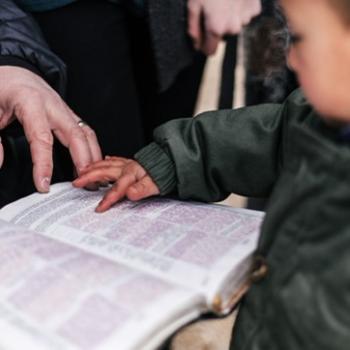The Minor Prophets are often quite neglected in the church today. Some find them inordinately difficult to interpret due to the genres these books employ, especially as they can cover the range of poetic, dialectic, prophetic, and apocalyptic styles all in one fell swoop. Others struggle to see the relevance they have within the church today. Some of this is due to a Marconian influence in failing to see their relevance to New Testament believers, whether that’s intentional or not. Some of it is due to people simply not knowing their Old Testament all that well. They may struggle to understand how God operates in terms of covenant, or how these covenants even relate to one another. They may likewise struggle with their eschatology, so these books prove to be all the more daunting for some, as they concern God’s redemptive work with Israel.
Then you have a rather large contingent in the church today that bastardizes the Minor Prophets in favor of adopting the ideologies bound up in Critical Race Theory, or the more popular movement concerning social justice. I have it in mind to do a series of posts concerning this very thing, where I give an exegetical treatment of the pertinent passages often quoted by social justicians. However, as this is not the focus of this particular post, I will simply summarize my critique in saying that God’s concern with biblical justice, as portrayed in the Minor Prophets, is primarily seen in terms of His covenant with Israel. Any treatment of our current social milieu that doesn’t place things squarely within this interpretive lens is dangerously myopic, at best. The point being: social justicians tend to place a heavy emphasis on righting perceived societal wrongs, but they do so to the detriment of the main points of these respective texts, which are grounded in Israel’s faithfulness (or faithlessness) to the Mosaic Covenant given in Ex. 19-24 (see also covenantal blessing and cursing in Deut. 28 and Lev. 26).
Yet one reason I believe the Minor Prophets are often neglected the most is that they tend to be rather sober reads. They require careful, personal reflection from the one who wishes to take the words of the apostle Paul seriously. The rather sordid history of Israel serves as an example and a warning to the church, so that the one who thinks he is standing firm should be careful not to fall (1 Cor. 10:11-12). As with Israel, Paul’s warning is seen in light of covenant faithfulness (1 Cor. 10:14-22). In the same manner, the author of Hebrews challenges the church to see Israel’s apostasy in the wilderness as a profound warning (Heb. 3:7-19). While this theme is not unique to the Minor Prophets, they nonetheless approach this topic from a different vantage point than other biblical authors. Think of it as the turning of a diamond to examine yet another facet of its brilliance.
I think of the book of Amos only because I’m currently preaching through it for my church—but here the prophet portrays God as a ferocious Lion set on devouring His prey, which are the ten tribes of Israel under the reign of Jeroboam II. The first two chapters drill this reality home as the Lion moves from region to region, drawing concentric circles around the Northern Kingdom. While the surrounding, pagan nations and the Kingdom of Judah have likewise drawn God’s ire, it is Israel who finds herself as the true target. In essence, those prior to those ten northern tribes are but the appetizer to the main course.
The reason for Israel’s judgment is bound up, again, in covenant unfaithfulness to the Lord, which plays out in a remarkably twisted manner. Those in power and affluence abuse the weak and the poor. Father and son fornicate with the same cultic prostitute, which indicates the nation is not only knee deep in the sexual perversion of incest, but they are idolatrous to boot. They encourage the breaking of vows for the Nazirites. They reject the prophets. Israel’s women lord over their husbands, and their husbands likewise fail to lead. The sacrificial system is exploited and corrupt in every conceivable way.
In all of it, God gives examples of warning after warning, calling them to repentance, only to give the refrain, “…yet you have not returned to Me.” Thus, the inevitable result of their sin is that God’s judgment has gone forth and it will not be returned. The Lion shall come and consume them in His wrath, yet all the while, they will not see His discipline through famine, drought, pestilence, swarms of insects, plague, warfare, and fire and brimstone. They shall come face to face with the living God Himself. Thus the summons is given to Israel, “Prepare to meet your God.”
Stark as the language may be, the command is not simply one of the inevitable reality all men must face. It is a plea. It is a plea to seek God and live. In other words: it is a plea that the ten tribes of the Northern Kingdom would repent and turn back to God. He is calling Israel back to covenant faithfulness so they may avoid eternal condemnation. God’s aim is not simply destruction, but restoration—and this is particularly where people of all stripes and convictions tend to bristle. We want to hear that God will leave the innocent party out of His plans for judgment such as this, but the book of Amos simply reveals that there was no innocent party to be found. All were commanded: return to the Lord, or perish.
God’s judgment is still seen as irrevocable. Israel is going to be summarily destroyed. Their women will be led off with hooks through the jaw. The idolater, oppressor, sexually immoral, and the one displaying an empty religiosity will likewise find no refuge from the impending onslaught of the Assyrians. Even those who were the poor and marginalized will be carted off to a foreign land to be slaves. There were no categories of sinners to be found who were less guilty than others; all the tribes were guilty. Yet with the plea to repentance, there is no contingency placed upon recalling the judgment sworn of God. In other words: whether they repent or not, judgment was still coming. Pain, agony, and misery would be multiplied to them all—but the Lord promised that those who turned to Him in repentance would live.
The problem is that Israel, much like many within the modern Evangelical church, was woefully deceived. This is where I find the warning to the church to be so poignant. We like to read the example given for us in Israel as if these are people who we could never be like. I’m sure the Israelites hearing of the prospect of them eating their own children felt much the same way (Lev. 26:29). Who could ever do such a thing, they might have asked? All one need do is read 2 Kgs. 6:24-29 to find two such women who did. For the one who sits in abject repulsion of such an act—you do well—yet you would do better to fear the circumstances which could ever produce such a vile act. On the basis of the text, it was not famine which led these women to such grotesque sin—it was covenant unfaithfulness.
The point is not to say that every individual will do such a thing, but that every person is capable of incredible evil. Evil need not look like it did between these two mothers simply because evil is not a principle defined of us. It can take the culturally acceptable look of ripping an infant limb from limb whilst in their mother’s womb. It can don the appearance of one who exploits those around them, seeing them as expendable objects rather than those who bear the very image of God. Likewise, it can embrace the sexual perversion bound up in a culture that defiles the marriage bed in every meaningful way. In all of it, the point where things terminate is in deception. Deception for the one who believes they can reject God and still be prepared to die. Yet likewise, deception for the one who believes they can fool God by living a double-life.
In either case, the prophet Amos provides a warning and a plea in the very same phrase: prepare to meet your God. To echo then the words of Christ, “Repent and believe the gospel!”













